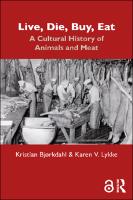Live, Die, Buy, Eat
Proposal review
A Cultural History of Animals and Meat
Author(s)
Bjørkdahl, Kristian
Lykke, Karen V.
Collection
Knowledge Unlatched (KU)Language
EnglishAbstract
Live, Die, Buy, Eat. These words represent a chain of events which today is disconnected. In the past few years, controversies around meat have arisen around industrialization and globalization of meat production, often pivoting around health, environmental issues, and animal welfare. Although meat increasingly figures as a problem, most consumers’ knowledge of animal husbandry and meat production is more absent than ever. Tracing a historical process of alienation along three distinct axes, the authors show how the animal origin of meat is covered up, rationalized, forgotten, excused, neglected, and denied. How is meat produced today, and where? How do we consume meat, and how have our consumption habits changed? Why have these changes occurred, and what are the social and cultural consequences of these changes? Using Norway as a case study, this book examines the dramatic changes in meat production and consumption over the last 150 years. With a wide range of historical sources, together with interviews and observation at farms, slaughterhouses, and production units, as well as analyses of contemporary texts and digital sources, Live, Die, Buy, Eat explores the transformation of animal husbandry, meat production and consumption, together with its cultural consequences. It will appeal to scholars of anthropology, sociology, cultural studies, geography, and history with an interest in food, agriculture, environment, and culture.
Keywords
Anthropology;SociologyDOI
10.4324/9781315564609ISBN
9781317188537, 9781472471789, 9781032404271, 9781315564609Publisher
Taylor & FrancisPublisher website
https://taylorandfrancis.com/Publication date and place
2023Imprint
RoutledgeClassification
Anthropology
Sociology


 Download
Download Web Shop
Web Shop